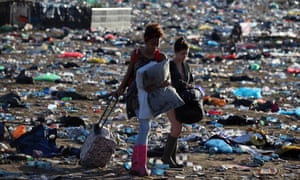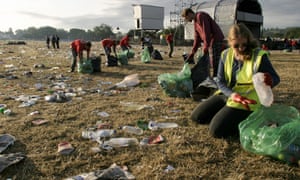https://www.theguardian.com/music/2019/feb/27/glastonbury-festival-bans-plastic-bottles?CMP=fb_gu&fbclid=IwAR144OqVK8xiwZfK6USj9pd3kPgWlYQM0ajhutFgyBAjFblVsbdY-KCTXwg
Glastonbury festival bans plastic bottles
Music festival will no longer sell single-use plastic water bottles in bid to cut waste
With its sea of discarded tents and litter-strewn fields, Glastonbury has become almost as infamous for the mountain of rubbish left in its wake as it is renowned for its music.
But this year, organisers are hitting back – by banning plastic bottles in a bid to stem the tide of waste.
They have announced the festival will not sell single-use plastic water bottles this year owing to concerns about their impact on the environment.
In 2017, visitors to the festival got through 1.3m plastic bottles.
“Obviously we are all fighting the fight against plastic, which is an enormous task but well overdue and we need to make steps in the right direction,” said Emily Eavis, the co-organiser of the festival and youngest daughter of the founder, Michael Eavis.
“A vast amount of plastic bottles were gotten through and when you see images of the arena completely covered in old plastic bottles it’s quite haunting.
“We have been working on this during the year off. We spent a lot of time in 2018 working on the logistic side of all this, speaking to suppliers and market managers, area organisers,” she added.
“We are tackling drinking bottles at the moment, water bottles … and we are encouraging people to bring their own reusable bottle but there will also be reusable bottles available on site.”
A Friends of the Earth spokesperson said it was an important step but there was much more to be done to tackle other littering issues linked to festivals. “We’ve seen other festivals giving plastic-free the headliner status it deserves so we’d urge Glastonbury to carry on along the path to plastic-free bliss.”
They added: “It’s time for all festivals to think about things such as food containers, cutlery and encouraging festivalgoers to ditch the plastic tat when thinking about fancy dress. It’s also important that festival kit such as tents is built to last rather than to be abandoned in a field after one use.”
Greenpeace estimates that globally, 12.7m tonnes of plastic end up in the oceans each year. With more than 1m plastic bottles sold at Glastonbury in 2017, the festival’s organisers said they felt stopping their sale was vital.
The organisers said they were encouraging all festivalgoers to use a reusable water bottle and refill it at the free water taps around the site. They said they would also increase the number of WaterAid kiosks on the site where people can refill their bottles or get a free cup of water. Water and soft drinks in recyclable cans will be available to buy from all traders who previously sold soft drinks in plastic bottles, while they will continue to recycle any recyclable waste plastics on site.
Backstage catering will also be plastic-free, with canned drinks and reusable water bottles available to performers.
Previously, the festival banned plastic cutlery and plates from food traders with everything having to be compostable. They note that they already have only paper straws on site. The festival already does not use single-use plastic cups at the bars and the wristbands are made of cloth.
Shambala festival has also taken steps to ban plastic. No drinks are sold in disposable plastics, only reusable bar cups are used and there are no plastic straws. No food is served in plastic and and there are no single-sachet sauces.
Richard Thompson, professor of marine biology at Plymouth University, said that while he would wish to know more detail the news was “a great step”.
Adding that it was also important for single-use plastic to be recyclable wherever possible, he said: “If there is a message for the industry, it’s that this should be a wake-up call and if you don’t get your act together and design plastic packaging so it’s genuinely compatible with recycling on a large scale, people will walk away from plastic.”


沒有留言:
張貼留言